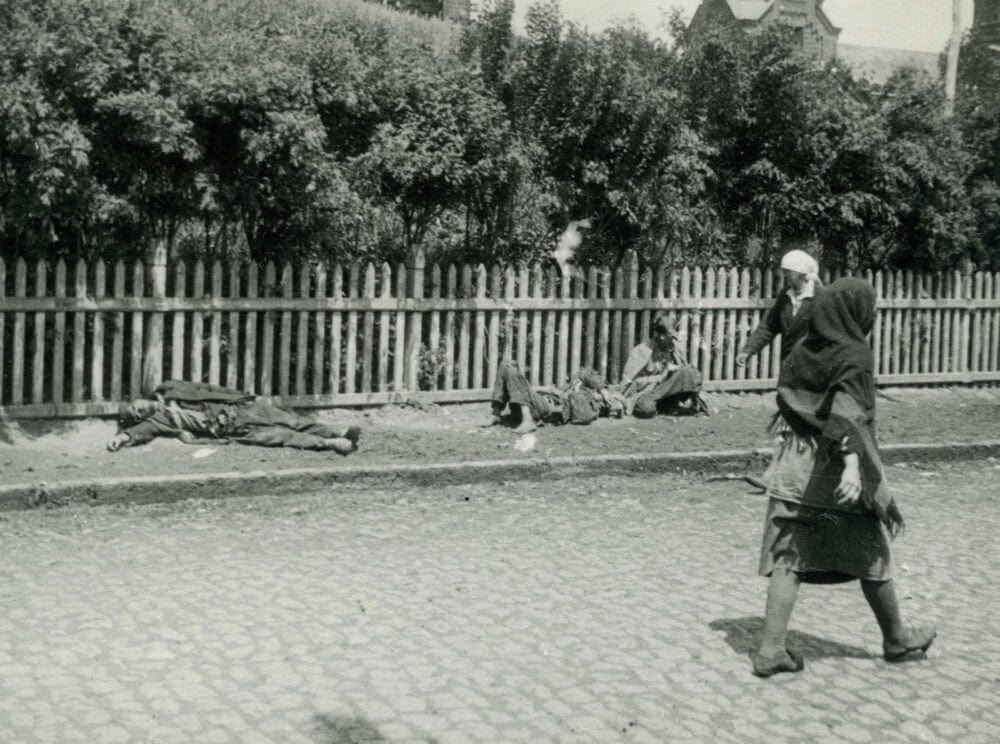Holodomor, the famine induced by Stalin in Ukraine between 1932 and 1933, killed more than 8 million people. Certain sources claim that the number of casualties among Ukrainians is double.
The tragedies in Ukraine, during the Holodomor, are terrible, and the worst are the cases of cannibalism, explained historian Armand Goșu for PressHUB.
“Political police reports reconstruct the context in which the husband was lured into the house, beaten, killed, and then cooked. In other cases, people dug up animals that died months ago, took the meat that was still on the bones, and tried to cook it.
In the spring, many saved themselves by eating roots”, said the historian.
The circumstances were so dramatic that trains passing through famine-stricken areas of Ukraine were forced to have curtains drawn on their windows. And they didn’t stop at the stations.
“Undressed or scantily clad children, women and men looked horrible, trying to enter into the stations with the hope that someone would throw a morsel of bread to them or clinging to the trains, to leave the villages that were blocked by the military, so that no one could leave”, mentioned Armand Goșu, for PressHUB.
Miraculous survival in the midst of famine
The cruel history of Holodomor, as recorded by archived documents, was lived by Vera Pulvas herself, and PressHUB spoke with her exclusively.
Vera Pulvas is 89 years old. She was born in a village in Ukraine in 1933, at the peak of the famine. An artificial famine induced by Stalin, who decided to take Ukrainian peasants’ farm produce from their households. Basically, supported by the political police and the army, Stalin took everything that meant grain.
Ukraine, the war at the end of a world
Left without food for them and for the animals, with no possibility of leaving the villages affected by famine, because they were surrounded by the army, at least 7 million Ukrainians died of starvation.
“Holodomor was mainly in the center of Ukraine, in our village; the village was called Iustingrad, and was located in the Kyiv region at that time. It was a difficult time. The soldiers were sent to our village from Moscow to take all our food.
They were in every house and took everything: grain, food, even the baby food. People were hiding the food in cribs, under the mattresses, but they searched and took everything. It was very difficult”, told Vera Pulvas to PressHUB.
Born in an unfortunate moment in Ukraine’s history, a genocide, she survived with great difficulty and with a lot of luck. Today, in Kyiv, she is going through a new war.
“My aunt lived in western Ukraine, where there was no famine, and she used to bring us flour and grain. That’s how they fed me. I almost died. Thanks to my aunt, I survived.
But people suffered, they looked for frozen potatoes in the garden, they looked for frogs and snails in the rivers. They ate leaves out of the trees, cut them down and fried them so they could eat. There were very bad cases, when small children died and then were eaten by their families”, found out Vera Pulvas from her parents, who saved her life.
Grain quota, impossible to deliver
Why did Stalin produce the severe famine in Ukraine? The collectivization had begun by force. The hard working peasants, land owners (“culaci”, the equivalent of “chiaburi” in Romania) who fought against the collectivization were either killed or arrested and deported to Siberia. And the rest of them were forced to give the state an unattainable grain quota.
“Due to the outstanding conditions of 1930, the harvest was truly exceptional, 25% higher than usual. That meant tens of millions of tons of grain in addition to the usual average. This record harvest encouraged Stalin to continue collectivizing and imposing higher quota on grain requisitions.
The challenge was that Stalin had a vital need to increase production, in order to sell it for export, to collect more money, and with that money to buy equipment for the industrialization of the USSR, Russia’s second largest industrialization” said historian Armand Goșu.
Stalin needed more money and he got it by selling grain. However, the agriculture was very much dependent on the climate at that time. And in 1931, the weather was no longer favorable.
“Less grain was produced, the harvest was lower by 20 million tons. Instead, the collection quota got even higher. In the world of the Ukrainian village, an outdated type of agriculture was practiced, as they did not have tools or agricultural equipment. They were dividing the harvest, one part for the family, one part for the animals, one part for sowing, and one part for sale.
Stalin, with his exaggerated quota, destroyed this balance, which was fragile anyway. Instead of taking the harvest designated for sale, 15-20%, he took 35%. The balance was completely destroyed. What remained for the population to survive decreased dramatically”, detailed Armand Goșu.
Soviet soldiers were taking the food hidden in children’s cribs
Famine killed millions of Ukrainians. Vera Pulvas remembers, for PressHUB, the stories of people falling on the street and dying right there, on the spot.
“There were hard times, people were dying, one could walk and die on the street. Hearses came to our village, took the corpses and got them out of the village, in mass graves.”
Even after so many years, the old woman has no good words about Soviet soldiers.
“People begged them to leave some food for the children, but they were very cruel, they took everything. In 1947 there was another famine, but it was easier for us to survive with the harvest we had. People were working the grain fields, but no one had the right to take even a few grains.
After the harvest, the children went to the field and gathered ears of wheat. But the fields were guarded by the soldiers, which caught the children, beat them up and took everything they had gathered. After such happenings, the children were very scared”, told Vera Pulvas.
One million arrested
In August 1932, Stalin passed a law to deport those not giving their crops to the state. Based on that law, nearly one million people were arrested in few months.
“The number of detainees was so high that Stalin had to intervene and stop the arrests”, mentioned Armand Goșu.
The terrible famine caused by all these measures claimed more than 7 million victims. To this day, the Russians still refuse to admit that Ukrainians were the victims of a genocide. They claim that the famine was not directed against the Ukrainians and was just a misguided economic policy.
“The Russians say that Stalin had nothing against the Ukrainians. It is well known that Stalin had something against the Ukrainians since the creation of USSR, when Lenin opted for a federation as a form of state. In Lenin’s decision, what happened in Ukraine played as well a very important part”, Armand Goșu explained for PressHUB.
Citește versiunea românească aici:




